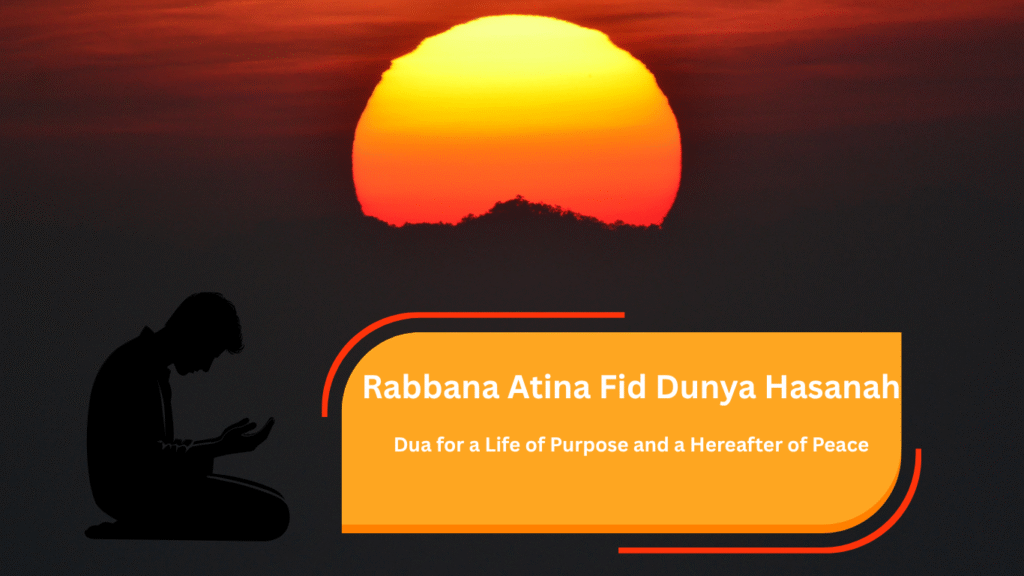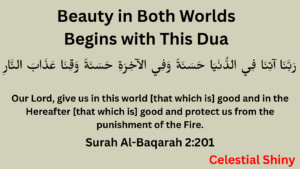
Rabbana Atina Fid Dunya Hasanah — The Dua That Teaches Balance Between Deen and Dunya
Introduction
There are moments in my life when the world feels loud — emails, deadlines, newsfeeds, and endless expectations. In those pauses between chaos and calm, I often whisper,
رَبَّنَا آتِنَا فِي الدُّنْيَا حَسَنَةً وَفِي الْآخِرَةِ حَسَنَةً وَقِنَا عَذَابَ النَّارِ
(Rabbana Atina Fid Dunya Hasanah Wa Fil Aakhirati Hasanah Wa Qina ‘Adhaban Naar) — “Our Lord, give us in this world what is good and in the Hereafter what is good, and protect us from the punishment of the Fire.” (Qur’an 2:201)
This short supplication captures what I’ve been trying to achieve for years: balance. As a Muslim living in the West, I juggle work, family, faith, and community, constantly reminding myself that Islam never asked me to choose between spirituality and worldly success — it asked me to harmonize them.
This is not just a dua; it’s a philosophy for living a complete life. Let’s explore why.
The Origin and Power of This Qur’anic Dua 
Allah ﷻ mentions this dua in Surah Al-Baqarah (2:201), nestled within verses about Hajj and remembrance. Scholars explain that it was revealed to teach believers how to ask comprehensively for good in both realms.
The Prophet ﷺ loved this dua deeply. It’s narrated in Sahih Bukhari (4522) and Sahih Muslim (2690) that he frequently recited it in his prayers. Abdullah ibn as-Saʿib reported: “The Prophet ﷺ used to recite between the two corners of the Kaʿbah, ‘Rabbana Atina Fid Dunya Hasanah Wa Fil Aakhirati Hasanah Wa Qina ‘Adhaban Naar.’”
That frequency shows how beloved and encompassing it is — a dua that covers every dimension of life.
Breaking Down Meaning of Rabbana Atina Fid Dunya Hasanah
Rabbana — Our Lord
The dua begins with tenderness. “Rabbana” means our Lord — not my Lord. It binds me to a community of believers seeking mercy together. When I say it, I’m reminded that I’m not alone; I’m part of an ummah.
Calling on Allah as Rabb acknowledges Him as my Nurturer, Sustainer, and Guide. It softens the heart before any request. Every sincere dua begins with recognizing Who controls outcomes.
Atina Fid Dunya Hasanah — Good in This World
What is Hasanah in the dunya? It’s not limited to wealth or comfort. Imam Al-Qurtubi said it includes every form of goodness health, halal provision, righteous spouse, and beneficial knowledge.
For me, living in the West, Hasanah often looks like balance: a job that provides without compromising Salah, friends who remind me of Allah, peace of mind in a fast culture, and contentment when society pushes for more.
It also means living ethically earning halal, consuming consciously, and caring for others. When I recite this part, I’m asking Allah to make my worldly life a means to please Him, not a distraction from Him.
Wa Fil Aakhirati Hasanah — Good in the Hereafter
The next line re-centers me completely. The dunya’s blessings are temporary; Hasanah in the Akhirah is eternal. Scholars define this as forgiveness, mercy, a safe judgment, and entry into Jannah.
I often reflect: when I ask for Hasanah in the Hereafter, I’m not only asking for paradise but also the ability to die upon faith. It’s my plea to remain steadfast until my final breath.
As the Prophet ﷺ said, “When Allah loves a servant, He makes death easy for him.” (Musnad Ahmad 24903)
So this portion of the dua reminds me that every worldly success must ultimately serve the next life.
Wa Qina ‘Adhaban Naar — Protect Us from the Fire
Fear and hope travel together. No matter how much good I do, I need Allah’s protection from my own weaknesses. This final plea wraps the dua in humility — acknowledging that only His mercy saves us.
The Prophet ﷺ taught, “None of you will enter Paradise because of his deeds alone, but only by the mercy of Allah.” (Sahih Muslim 2816)
When I whisper this line, I feel grounded. It reminds me that paradise isn’t earned by effort but by grace.
Balancing Deen and Dunya: A Modern Reflection
Living in London, I see Muslims excelling in every field medicine, business, academia yet struggling quietly with spiritual emptiness. This dua calls us back to equilibrium.
Islam never condemned ambition; it just redirected intention. Earning well, studying hard, or pursuing dreams are all acts of worship if they’re done for Allah’s sake. As Allah says:
“And seek, through that which Allah has given you, the home of the Hereafter; yet do not forget your share of the world.” (Qur’an 28:77)
That verse beautifully mirrors Rabbana Atina Fid Dunya Hasanah. It’s not about renouncing life but sanctifying it. When I strive for career goals, I ask myself, Is this bringing me closer to Allah or further away?
Balancing deen and dunya is an ongoing jihad a struggle of priorities. This dua is my daily reminder to keep both in check.
How to Incorporate This Dua Daily
After Salah
I recite it after every obligatory prayer. It takes seconds yet realigns my heart five times a day.
In Sujood
Prostration is the most intimate moment with Allah. Whispering it then feels deeply personal — it’s when dunya and akhirah both seem within reach.
During Hardship
When anxiety or loss hits, I repeat it quietly. It reminds me that even hardship carries Hasanah if I respond with patience.
With Family
I teach my children to say it before bed. It anchors their understanding of life — to seek good here and beyond.
In Mindfulness Practice
Western Muslims often explore meditation; I use dhikr instead. Repeating this dua mindfully slows my breathing, calms my heart, and connects me with divine purpose.
Spiritual Lessons and Benefits of Rabbana Atina Fid Dunya Hasanah
Comprehensiveness: It covers every need: physical, emotional, spiritual.
Gratitude: It teaches me to thank Allah for both small comforts and eternal hopes.
Humility: Admitting that without His protection, I’m lost.
Moderation: Islam isn’t asceticism; it’s balance.
Connection: It unites the ummah through a universal prayer.
The Prophet ﷺ said: “The closest a servant is to his Lord is while he is in prostration, so increase your supplications.” (Sahih Muslim 482) — and this dua is one of the best to increase.
My Personal Experience with This Dua
Years ago, when I first moved to Europe, I chased stability — a good job, a nice home, a routine. But even after achieving them, something felt incomplete. One Ramadan night, I heard this dua recited softly during Taraweeh, and it resonated like never before.
Since then, I’ve made it my anchor. Whenever life overwhelms me, I pause and repeat it. It’s more than a phrase; it’s a calibration of purpose a way to realign my goals with faith.
Sometimes I whisper it before meetings or while driving through city traffic. Each time, it resets me: “Ya Allah, let this dunya serve my Akhirah.”
Practical Steps to Live Its Meaning
Define your “Hasanah.” What truly benefits you here — peace, purpose, family, health? Ask Allah specifically.
Attach intention to every task. Work, study, fitness — make it ibadah.
Protect your akhirah with boundaries. Guard time for prayer and reflection.
Give Sadaqah. Worldly good becomes eternal when shared.
Reflect daily. End each night asking, Did I seek dunya Hasanah or akhirah Hasanah today?
Conclusion
Rabbana Atina Fid Dunya Hasanah isn’t just a dua; it’s a life compass. It keeps my ambitions sacred and my faith grounded. Every repetition reminds me that Islam doesn’t demand withdrawal from the world — it demands presence with purpose.
May Allah grant us goodness in this life in our work, families, and hearts and goodness in the next in His mercy, forgiveness, and eternal peace. Ameen.
Recommended: How to Balance Deen and Dunya
FAQs
- What does “Rabbana Atina Fid Dunya Hasanah” mean?
It means, “Our Lord, give us in this world what is good and in the Hereafter what is good, and protect us from the punishment of the Fire.” (Q 2:201) - When should I recite this dua?
It can be recited after Salah, in sujood, during hardship, or anytime you want to seek balance and mercy. - Is this dua from the Qur’an?
Yes, it’s directly from Surah Al-Baqarah (2:201). - Did the Prophet ﷺ recite this dua often?
Yes, he recited it frequently, especially during Tawaf around the Kaʿbah. (Sahih Bukhari 4522) - Can I recite it for worldly success?
Yes, Hasanah fid-dunya includes halal success, peace, health, and contentment. - What does “Hasanah” mean?
It means goodness, excellence, or righteousness — all forms of beneficial good. - Is it okay to recite in English?
You may understand it in English, but reciting in Arabic holds its original power and beauty. - Can I teach my children this dua?
Absolutely; it’s short, easy to memorize, and shapes balanced Islamic values early. - Does this dua help with stress?
Yes; its reflection on divine balance and protection brings emotional calm and spiritual grounding. - Why is this dua called comprehensive?
Because it covers dunya, akhirah, and protection from Hellfire the three essentials every believer needs.